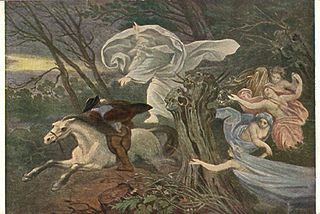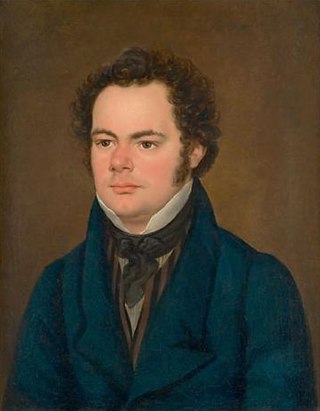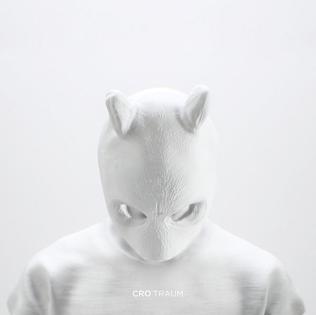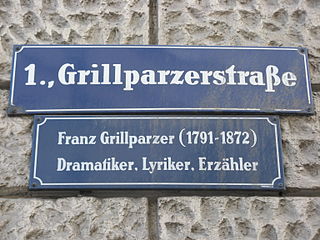
Winterreise is a song cycle for voice and piano by Franz Schubert, a setting of 24 poems by German poet Wilhelm Müller. It is the second of Schubert's two song cycles on Müller's poems, the earlier being Die schöne Müllerin.

"Erlkönig" is a poem by Johann Wolfgang von Goethe. It depicts the death of a child assailed by a supernatural being, the Erlking, a king of the fairies. It was originally written by Goethe as part of a 1782 Singspiel, Die Fischerin.

"Ellens dritter Gesang", in English: "Ellen's Third Song", was composed by Franz Schubert in 1825 as part of his Op. 52, a setting of seven songs from Walter Scott's 1810 popular narrative poem The Lady of the Lake, loosely translated into German.

Schwanengesang (Swan Song), D 957, is a collection of 14 songs written by Franz Schubert at the end of his life and published posthumously:
- Liebesbotschaft (text: Ludwig Rellstab)
- Kriegers Ahnung (Rellstab)
- Frühlingssehnsucht (Rellstab)
- Ständchen (Rellstab)
- Aufenthalt (Rellstab)
- In der Ferne (Rellstab)
- Abschied (Rellstab)
- Der Atlas (Heinrich Heine)
- Ihr Bild (Heine)
- Das Fischermädchen (Heine)
- Die Stadt (Heine)
- Am Meer (Heine)
- Der Doppelgänger (Heine)
- Die Taubenpost (alternative: D 965a) (Johann Gabriel Seidl)

A drinking song is a song sung while drinking alcohol. Most drinking songs are folk songs or commercium songs, and may be varied from person to person and region to region, in both the lyrics and in the music.
Album for the Young, Op. 68, was composed by Robert Schumann in 1848 for his three daughters. The album consists of a collection of 43 short works. Unlike the Kinderszenen, they are suitable to be played by children or beginners. The second part, starting at Nr. 19, is marked Für Erwachsenere and contains more demanding pieces.

Hermann Ritter was a German viola player, composer and music historian.

"Traum" ("Dream") is a 2014 single by German rapper Cro. Released on 9 May 2014, it is his seventh single and the first release from his 2014 album Melodie. It was also released as a remix CD containing six tracks, including the radio single, remixes and instrumentals of the song. On 17 February 2015, Cro released an English version of the song titled "Dream" on iTunes.

"Traum durch die Dämmerung", is both a German poem by Otto Julius Bierbaum and a Lied by Richard Strauss, his Op. 29/1. The opening line is "Weite Wiesen im Dämmergrau". It is the first of three songs by Strauss based on love poems by Bierbaum, composed and published in Munich in 1895, and dedicated to Eugen Gura. The works were scored for medium voice and piano, and published by Universal Edition as 3 Lieder mit Klavierbegleitung, later with English versions and orchestral arrangements.

Franz Rupp was a German-American pianist and accompanist.
"Der Mondabend" is a poem by Johann Gottfried Kumpf, who published his poetry under the pseudonym Ermin in Carinthia, a periodical he had founded in 1811.

Franz Schubert's best known song cycles, like Die schöne Müllerin and Winterreise are based on separate poems with a common theme and narrative. Other song cycles are based on consecutive excerpts of the same literary work: Schubert's "Ave Maria" is part of such a song cycle based on excerpts of the same poem, in this case by Walter Scott.
Die Sterne is a German pop band. "Die Sterne" translates as "the stars" and may also refer to:

Träumen und Wachen, WAB 87, is a song, which Anton Bruckner composed in 1890 to celebrate the 100th anniversary of Franz Grillparzer's birth.

Unser lieben Frauen Traum Op. 138, No. 4, is a sacred motet for unaccompanied mixed choir by Max Reger. The German text is a poem by an anonymous poet, derived from a Volkslied. The piece is in F major and scored for up to six voices, SSATBB. Composed in Meiningen in 1914, it was published in 1916 after Reger's death as the fourth of Acht geistliche Gesänge. It is often performed in Advent.

"Du bist die Ruh' ", D. 776; Op. 59, No. 3 is a Lied composed by Franz Schubert in 1823. The text is from a set of poems by the German poet Friedrich Rückert (1788–1866). It is the third poem in a set of four. This song is set for solo voice and piano.
In music, Op. 50 stands for Opus number 50. Compositions that are assigned this number include:

"Gesang der Geister über den Wassern" is a 1779 poem by Johann Wolfgang von Goethe (1749–1832). It may be best known in the English-speaking world through a musical setting of 1820–21 by Franz Schubert (1797–1828) as a part song for men's voices and low strings (D.714).
This page is based on this
Wikipedia article Text is available under the
CC BY-SA 4.0 license; additional terms may apply.
Images, videos and audio are available under their respective licenses.











